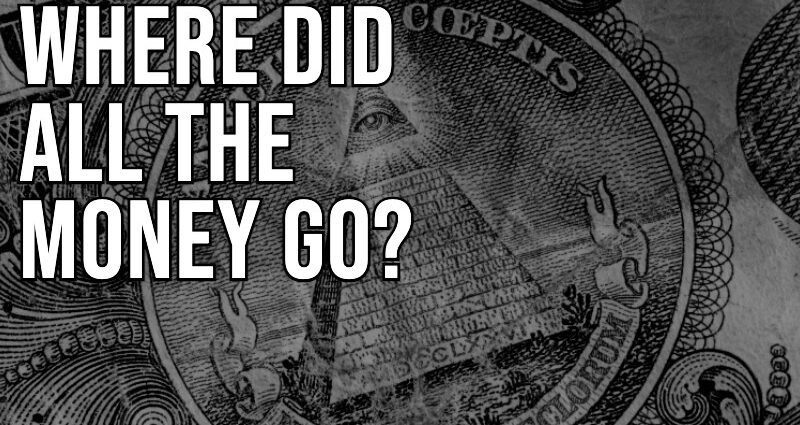I’m gonna open this can of worms today and uncover the most sought after conspiracy in the touring world. I almost constantly hear “Do We Have Budget For That?” or, “Mgmt is being too cheap” or, my favorite, “It would be so much better if we just spent the money”. I’m here today to address the age old question, Where Did All The Money Go?
Let’s break this down in a simple, matter of fact way. We’ll use this template:
- 6-Week tour with 1 bus and 1 truck.
- Playing roughly 1500-2k capacity rooms.
- Let’s say they get a smooth $10k guarantee average
- 5 shows/week
- 5x Band, 5x Crew – TM/FOH, Mons, Backline x2, LD. (Plus Merch Person)
I’ll try to stay impartial.
Understanding The Process
We need to understand the process of how a tour gets booked. In my experience, this is often how it goes down (very basic version of it, of coarse). Mgmt/The Artist decide to go on tour based on their promo, album release, and career plans. Could be to announce the tour the day the single drops, could be marking a 20th anniversary of a popular record, could be to try and make some cash and stay relevant. Whatever the reason is that gets a tour in motion, this is an example of how it starts.
- Agent submits dates/projected routing to the team.
- Tour Manager (or whoever on the team is in charge of this) makes the budget.
- Mgmt/The Artist reviews and decides if you’re going to do it or not.
Making The Budget
General Line Items
Most budgets have a general template that include the following line items:
- Salaries/Per Diems
- Transportation (Buses, Trucks, Flights, Ground Tranpso)
- Accommodations (Hotels)
- Production (Sound, Lights, Video, Etc)
- Pre-Production (Rehearsals, Advancing, and cost to get it off the ground)
- Legal (Insurance, Lawyers, etc)
Commissions
Going one step further with our template option from above, let’s go with the industry standard for commissions. Booking Agent gets 10%, Mgmt gets 20%. These numbers are normally based on gross. So that means if you have a $10k guarantee, then the booking agent gets $1k, and mgmt gets $2k. That leaves you with $7k/show to pay for everything else. Often times the artist will have business manager that gets a commission as well. Let’s say that’s 5% on Gross.
Boom, just like that… $6500/show.
Overages
Let’s say these are “90/10 Versus Deals”. That means you either get your guarantee of $10k or 90% of the ticket sale revenue minus the pre-approved expenses at the show settlement. Let’s say for example this tour is going to be 70% sold and no shows will get into any overages.
Merch/VIP
These days, this is the only way that anyone makes any real money. That being said, they are variables. The predictions need to be low when factoring in the numbers towards the actual tour budget in case your designs aren’t as hot as you think they are. These budgets are often managed by a third party company under the supervision of the artist’s manager. Both merch and VIP require their own budgets since they have cost involved and different commissions.
Contingency
This line item is underrated. You have to leave yourself breathing room and have enough money in the contingency to get yourself out of a jam once you’re out on the road. Even if you’ve planned the best tour ever with the best budget, you cannot control the variables. Here are some ways that I’ve dabbled into the contingency in the last year.
- Someone quits or gets fired
- Someone has to go home for a family emergency
- Travel plans get messed up and you have to throw money at it to save the show
- Venue change that requires different production
- Conversion rates changed drastically with international travel
- Fuel cost fluctuated
These are all things that have happened this year alone. You have to have contingency money.
Long Game – Thinking Of The Future
It’s possible that your current tour needs to turn a profit to pay for the album release. It’s possible that you’re on tour support and the tour just needs to lose less. You could even find yourself in a situation where the artist is in so much debt, that the tour has to make money to pay someone back. Whatever the current “Why” is, that needs to be the forefront of all budgetary decision making. You need to long game it.
Cost Per Day
I always like to think about tours in a cost/day and cost/show formula. I like to know how much money it costs to do a show, and how much it costs to have a day off. This gives you a realistic amount of cash you need to be bringing in each show on average so you can go back to the team and say “this tour needs roughly $3900 more per show to break even”. Generally, I put this into the equation at the bottom of the summary page to see what we’re dealing with.
Moving Forward With The Tour
Once your budget gets approved, then the hard part starts. Staying within it. The more you can get locked in in advance, the more money you will save and the better your final budget prediction will be.
Summary
So… Where did all the money go? Attached with the download link below. Take a look at the most basic of budget templates (Literally the Business Budget Template in Microsoft Excel that I used to mock something up to make this point), to show the math on the tour template mentioned above. Keep in mind, this is just to make the point that money disappears much faster than you would think. It is rough and not very elaborate. When I do a real tour budget, I have roughly 70 Lines of all broken down expenses and a bunch of shit that us admin folks don’t wanna admit we have to spend money on.
There you have it. A breakdown of Where Did All The Money Go… As always, if you have any questions, hit me by email – [email protected]
Have fun out there.

